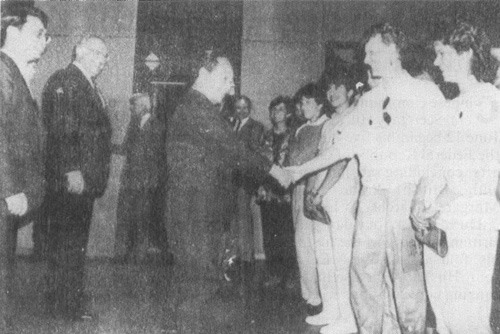|
 |
|
Hu Yaobang and Helmut Kohl greet German students visiting the Chancellery in 1986 ( QI TIEYAN, NO. 25, 1986 OF BEIJING REVIEW ) |
Chinese Communist Party General Secretary Hu Yaobang on June 12, 1986 began his five-day visit to the Federal Republic of Germany, after concluding satisfactory talks with British Prime Minister Margaret Thatcher in London.
During his four-day stay in Britain, which was the first leg of his four-nation West European tour, Hu Yaobang also had wide-ranging conversations with heads of major British political parties, including David Owen, leader of the Social Democratic Party, Neil Kinnock, the British Opposition Labour Party leader, and Norman Tebbit, chairman of the Conservative Party.
On June 11, Queen Elizabeth II, who will make a state visit to China this October, held a luncheon in Hu's honour at Buckingham Palace.
During his visit, Hu and Thatcher exchanged suggestions on further developing bilateral cooperation between the two countries and discussed a wide range of global issues. Referring to the Sino-British agreement on Hong Kong, Hu said that satisfactory settlement of the Hong Kong issue had created favourable conditions for furthering Sino-British relations. Hu said the agreement set a good example of peaceful settlement of international disputes through negotiation, thus bringing honour to the two countries. Margaret Thatcher described the Hong Kong agreement as "the most striking achievement of creative policy."
The expansion of bilateral trade between Britain and China was covered during their talks.
On June 9, a memorandum of understanding was signed in London between China, Britain and the Sir Yue-Kong Pao Foundation aimed at establishing a Sino-British friendship scholarship programme. The 10-year plan, which will begin in April 1987, intends to provide scholarships in Great Britain for Chinese students, particularly those majoring in science, technology, economics and social sciences. Under the scheme, the Sir Yue-Kong Pao Foundation and the Chinese government will each contribute 1.4 million pounds while Britain will contribute 700,000 pounds as well as the cost of management services.
The main goal of Hu's trip, however, was to outline China's current foreign and domestic policies for his Western hosts. On June 11, Hu said in a major policy speech at the Royal Institute of International Affairs in London that China's basic national policy in this century and the next boiled down to two points. The first is to promote a sustained and steady growth of China's economy by the execution of the policy of reform and opening to the world. The second goal is to ensure that China concentrates on development without interruption by pursuing an independent foreign policy based on maintaining peace.
In Bonn Hu further made his points for a group of industrialists and businessmen at the Congress of Industry and Commerce of the Federal Republic of Germany. Hu said that no country could succeed in its modernization drive if it shut the door to the outside world. The opened door of China will never be closed again, Hu said. If any further change should occur in the open policy, it will render the system more conducive to economic co-operation and exchange, Hu stressed.
Hu called on West European businessmen to take a long-term perspective in their transactions with China to help boost the country's exports.
During his stay in Federal Germany, Hu held talks with Chancellor Helmut Kohl and Willy Brandt, chairman of the Social Democratic Party. He met with Federal German President Richard Von Weizsaker at the presidential residence on June 13.
Over the years, Federal Germany has been China's number one European trade partner and ranks third in China's foreign trade volume, next only to Japan and the United States. The total value of bilateral trade between the two countries in 1985 exceeded US$3 billion, 38.3 percent more than the previous year and more than 11 times greater than in 1972, the year the two established diplomatic relations. | 